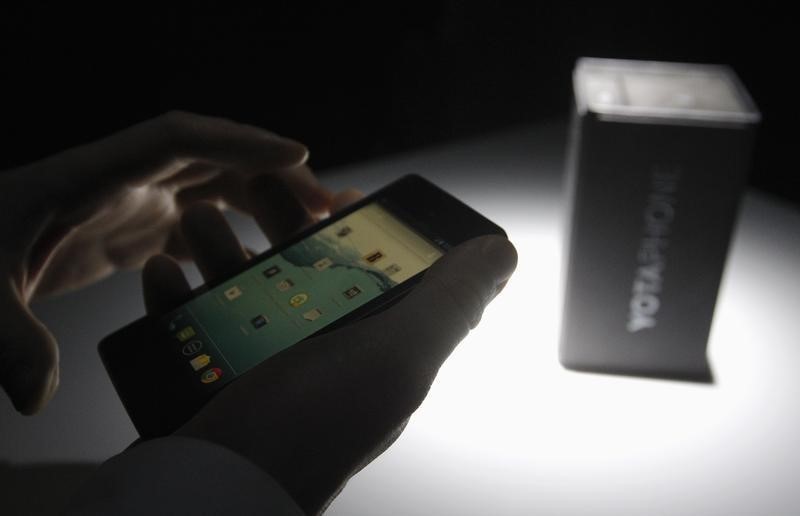By Eric Auchard
FRANKFURT (Reuters) - Russia's Yota Devices, the maker of a dual-screen smartphone which has so far proved a flop with consumers, has reached its first mass market distribution deal with an agreement to sell phones in China through state-backed Potevio Co. [CNPUTA.UL]
The YotaPhone has attracted a minor cult following among gadget enthusiasts with its distinctive, two-screen phone that seeks to stand out in a crowded, undifferentiated mobile market.
While the phone has a conventional screen for calls and other common phone functions, on the flip side it sports a second, always-on display that streams social media, text messages, maps, weather and breaking news and works as a mini e-book reader.
The YotaPhone has enjoyed the high-profile backing of President Vladimir Putin who was photographed handing one to Chinese Prime Minister Xi Jinping on his November trip to China.
Moscow-based Yota said late Tuesday that Potevio would begin sales across China of its latest YotaPhone2 models this quarter. Potevio sold 36 million phones in China last year for a total of 46 billion yuan ($7.4 billion), according to the company.
Yota Chief Executive Vlad Martynov said an earlier version of the YotaPhone, which sold poorly in 20 countries where it was marketed, was merely a proof of concept, but that China held out promise as the Russian handset maker's first mainstream market.
"China will be the biggest market in terms of volumes, no doubt about that," Martynov told Reuters in a phone interview.
TRYING TO STAND OUT
Martynov said Yota had reached deals with the biggest online sales portals in China and signed up 20 top content providers to offer popular local features including social media, search, e-book, stock and weather information.
But entering the world's most competitive phone market poses significant challenges. While more than 284 million phones were sold in China in the first nine months of 2014, according to government data, shipments fell 10.9 percent year over year.
Moreover, in excess of 90 percent of handsets were sold by domestic brands, which charge around $200 for increasingly sophisticated smartphones, leaving less than 10 percent of the market to foreign brands priced at $400 to $500 or more.
Martynov said Yota was betting its unique dual-screen features and localized content would distinguish it from other high-end phones running Google's Android software, while selling at somewhat lower prices than rival premium-priced phones.
Data from market research firm IDC showed Yota shipped only 109,000 phones in the five quarters ending in December. Russia received 55 percent, Central and Eastern Europe took 26 percent, but shipments to Western Europe and elsewhere were tiny.
"The problem with Yota is that it looks like an interesting concept," IDC mobile analyst Francisco Jeronimo said of the dual-screen. "But when we started playing around with the latest model, we asked ourselves whether we really needed two screens."

Yota is 25.1 percent-owned by Russian state conglomerate Rostec, while Telconet Capital, a fund backed by Russian technology entrepreneurs, has a 74.9 pct stake.